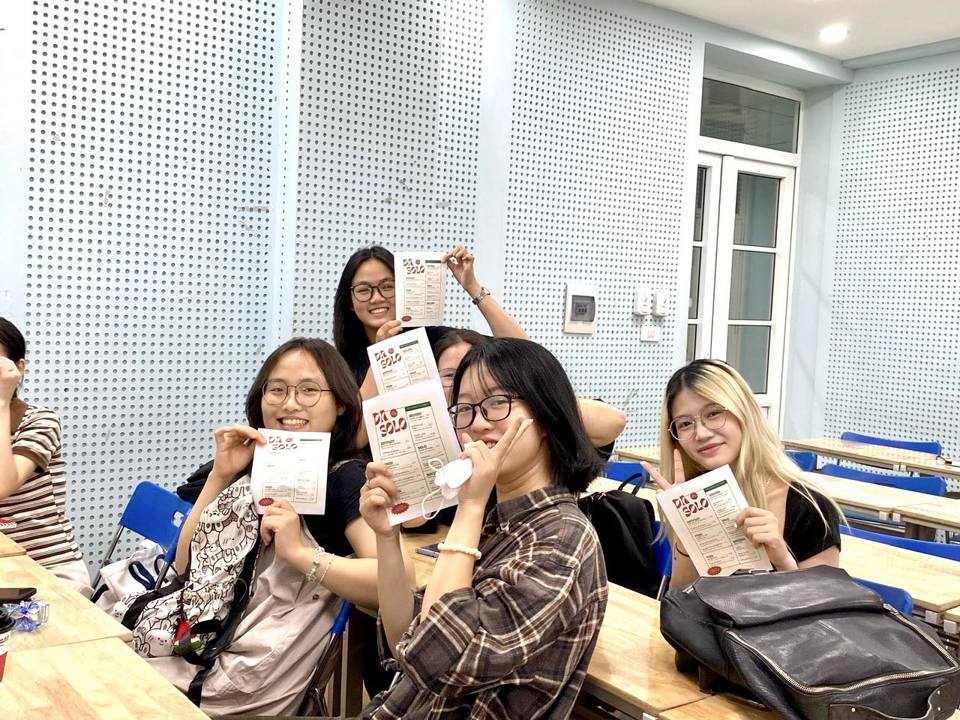Difficult first steps
In the period of global integration, when foreign languages are the key to open the door to the world , in addition to the languages: English, Chinese, Korean, Japanese, French, German, Russian; many candidates choose a narrow niche when deciding to pursue rare and unpopular languages in Vietnam such as: Spanish, Portuguese, Arabic, Thai, Indian, Italian...
When choosing these languages, candidates need to have the right attitude and spirit to learn, not afraid of difficulties or hardships because most rare languages have their own alphabets, not following the Latin alphabet. Rare languages are difficult to write, difficult to remember, and must be learned from the beginning.
Not only does it cause difficulties in pronunciation and vocabulary learning, but the grammar of rare languages also gives many people headaches or the intention to give up early. In addition, the learning conditions of rare languages compared to other popular foreign languages are difficult and limited, such as lack of textbooks, few lecturers, limited support equipment... and especially lack of communication conditions.

In reality, not everyone who wants to learn a rare language can learn it because in addition to patience, long-term orientation for the future plays a very important role. If the learner has a clear purpose, rare languages will create many opportunities for the learner in the future.
As a teacher of Arabic - a rare language, MSc. Phan Thanh Huyen, Acting Head of the Department of Arabic Studies, Faculty of Oriental Studies (University of Social Sciences and Humanities - Ho Chi Minh City National University) said: compared to other languages, Arabic is very difficult, so learners will have to make a lot of effort and face many challenges to learn it. When learning Arabic, learners must always be persistent and brave to overcome the initial challenges in pronunciation and grammar.
One of the important requirements when learning a rare language is that the learner also learns and learns English in parallel. Taking the example of Indian languages, according to Associate Professor, Dr. Do Thu Ha, Head of the Department of Indian Studies, University of Social Sciences and Humanities (Vietnam National University, Hanoi), there are still many people who have misconceptions when it comes to the study of Indian studies. India does not have a national language, but only has English and Hindi as its administrative languages. Therefore, to penetrate this market, English is the leading tool for students to communicate, study and work.
Associate Professor Dr. Do Thu Ha also shared that when learning a language, students need to nurture their passion, learn along with the culture of that country and invest in the specialized vocabulary they pursue.
“Some students only learn enough to communicate normally, lacking the language in their specialized field, making it difficult to work. Learning a language has many levels, so students need to practice, make efforts and determine their learning goals to become high-quality workers" - Associate Professor, Dr. Do Thu Ha analyzed.
Open opportunities
One of the good opportunities for students majoring in rare languages is that there are many opportunities to study abroad on scholarships. A representative of the University of Foreign Languages, Vietnam National University, Hanoi said that the school has a Department of Arabic Language and Culture.
The unit has good relations and regularly receives support from many embassies of Arab countries in Vietnam through scholarships for students to study abroad. The school has many different scholarships, including 1-year scholarships at universities in Egypt, Kuwait, Qatar; 2-month scholarships in Oman... From the 2017-2018 school year, the Qatar Embassy has granted scholarships to encourage Arabic students from disadvantaged backgrounds with good academic achievements.
In addition, embassies provide books and reference materials for teaching Arabic, allow students to do internships at the embassies, and invite students to participate in events organized by the embassies to help students have more opportunities to communicate and become familiar with Arabic customs and practices.
At the Portuguese Department of Hanoi University - the only place to provide formal Portuguese training in Vietnam today, students always have the opportunity to participate in a free Summer course at the University of Macau. They can also receive a full scholarship awarded by the Camões Institute (Portugal) to study a Summer course, a 1-year course, intensive training, master's and doctoral training at leading universities in Portugal. Studying at the department, students can also participate in the Portuguese Cultural Week organized annually by the department in collaboration with embassies and consulates, and many activities and clubs throughout the school.
Not only that, the job opportunities for students majoring in rare languages are also very good with high salaries, sometimes 2-3 times higher than those of common languages. With the Portuguese Department - Hanoi University, after graduation, students are capable of working at diplomatic agencies (embassies, consulates of Portuguese-speaking countries in Vietnam or abroad), government ministries, non-governmental organizations, investment projects, trade representative offices, travel companies or becoming Portuguese teachers.
Currently, the Brazilian Ambassador to Vietnam is trying his best to introduce more Brazilian companies and organizations to invest and work in Vietnam and thus, in the future, job opportunities for graduates will become more and more diverse.
With the Arabic Language and Culture Department - Hanoi University of Foreign Languages, the number of graduates always reaches 100%. The graduates are currently working at agencies such as embassies, the Central Party Committee's Foreign Affairs Committee, the Ministry of Public Security, Interpol, Vietnam Airlines, Emirate Airlines; representing labor export companies...
MSc. Phan Thanh Huyen, Acting Head of the Department of Arabic Studies, Faculty of Oriental Studies, University of Social Sciences and Humanities - Ho Chi Minh City National University, affirmed: “Those who pursue the Arabic language to the end have mostly achieved great success in their careers. Currently, opportunities for students to work for commercial companies with Arabia are increasing significantly. Students can also work for government organizations, non-governmental organizations, diplomatic agencies related to Arab countries. In addition, students can work for state agencies, organizations, diplomatic agencies or pursue research and translation careers...”.
The same is true for other rare languages such as Indian, Spanish, Italian, etc. “South American companies are constantly investing in Vietnam. Foreign language students can develop their strengths as translators and interpreters for companies doing business with Portuguese-speaking countries,” said Mai Lan, director of a trading company that regularly cooperates with the Portuguese market.
Students who have chosen to study rare languages need to keep in mind that when they conquer difficult languages, many advantages will come. The obstacle when pursuing rare languages is themselves. Competing for a career with these languages is also with themselves. Just overcome yourself and improve your ability every day, many new horizons will open up. Young people today are very good at technology, thanks to technology, the ability to learn rare languages is much easier than before.
MSc. Phan Thanh Huyen , Acting Head of Arabic Studies Department,
Faculty of Oriental Studies, University of Social Sciences and Humanities
- Ho Chi Minh City National University
Source: https://kinhtedothi.vn/thach-thuc-va-co-hoi-cua-nganh-ngon-ngu-hiem.html




















































![[Maritime News] More than 80% of global container shipping capacity is in the hands of MSC and major shipping alliances](https://vphoto.vietnam.vn/thumb/402x226/vietnam/resource/IMAGE/2025/7/16/6b4d586c984b4cbf8c5680352b9eaeb0)













































Comment (0)